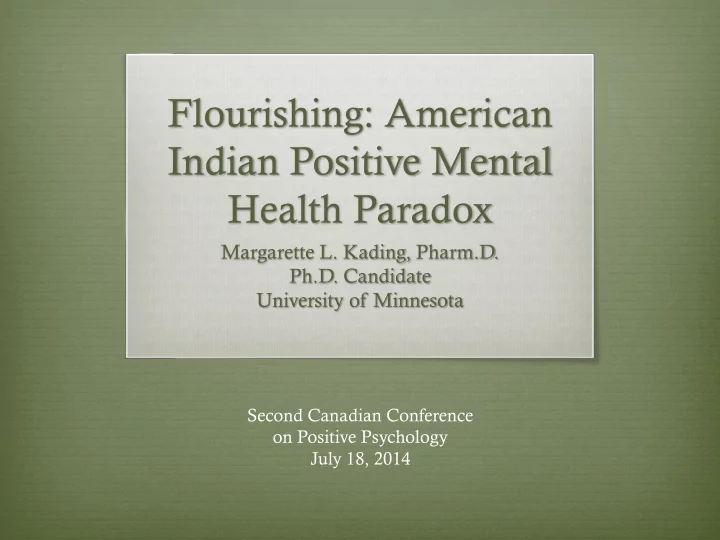

Flourishing: American Indian Positive Mental Health Paradox Margarette L. Kading, Pharm.D. Ph.D. Candidate University of Minnesota Second Canadian Conference on Positive Psychology July 18, 2014
Thank you to: Melissa L. Walls, Ph.D. Laura C. Palombi, Pharm.D., MAT Reid C. Smith, Pharm. D. Benjamin D. Aronson, Pharm.D. Community Research Council members
Why Positive Psychology? Medicine treats mental illness Positive psychology prevents mental illness Strengths-based research (Kirmayer)
What is Positive Mental Health? Keyes • Spectrum of well-being • Flourishing — Moderate — Languishing • Flourishing = high level of emotional, psychological, • and social well-being Mental Health Continuum — Short Form • Wellness ≠ absence of illness •
PMH = further from the edge • Flourishing prevents depression (Wood & Joseph, 2012)
PMH Prevalence and Health Outcomes 17.2% flourishing without depression Associated with better physical health, better psychosocial functioning, less missed work, decreased health care utilization (Keyes 2004, 2005a, 2005b) 56.6% moderately mentally healthy *MHC-LF, tertile cutoffs
Ethnic Minorities and Mental Wellbeing Greater levels of mental wellbeing (Gallo et al. 2009; Ryff; Keyes, 2009; Keyes & Hughes 2003) Despite discrimination Various explanations proposed Black Americans Lower rates of mental disorders Higher rates of flourishing mental health (20.7% flourishing and not depressed)
American Indians (AI), Health, and Historical Trauma High prevalence of depressive symptoms and psychological distress High prevalence of diabetes Historical trauma impacts social and psychological responses Marginalization “Culture as treatment” (Gone, 2013)
Methods/Sample 218 AI adults with Diabetes Type 2 Cross-sectional Measures PHQ9 — depression scale MHC-SF —Keyes’ PMH scale Traditional cultural activities Discrimination
PHQ-9 17% Not Depressed Depressed 83%
MHC-SF 60% 50.3% 50% 40% 32.1% Not depressed 30% Depressed 20% 13.5% 10% 1.6% 1.6% 1.0% 0% Languishing Moderate Flourishing
Discrimination Traditional cultural activities Control Variables Years with Diabetes Age Location Gender On/off reservation Income
Conclusions Mental health paradox Highlights potential resilience Strengths-based AI research
Thank You
Recommend
More recommend